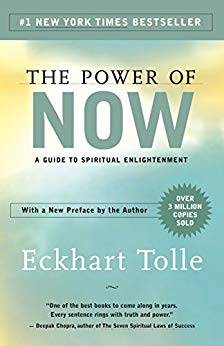

This article is an excerpt from the Shortform summary of "The Power of Now" by Eckhart Tolle. Shortform has the world's best summaries of books you should be reading.
Like this article? Sign up for a free trial here .
Want to build stronger relationships with your spouse, partner, and loved ones? How does being present improve your relationships? Here we’ll discuss Eckhart Tolle’s best advice on relationships, and how to be present in a relationship.
Being present impacts your inner state first and foremost. That affects your behavior and, inevitably, how you interact with people around you.
According to Eckhart Tolle, if you are acting on your ego’s influence — largely based on fear and the impulses of your pain-body — you are not reacting to the world as it actually is, but rather to your ego’s perception of it. When you are present and connected with your true self, you can be free of these influences and react genuinely to a clear-eyed view of the world and people around you.
Both Partners Must Be Present For a True Love Relationship
Without presence, a romantic relationship will fall victim to a love/hate cycle because true love can only be felt through presence. The ego will make you misconstrue actions and situations and cause you to be reactionary, eventually poisoning the relationship.
Don’t Require the Other for Happiness
This is a counterintuitive piece of advice from Eckhart Tolle – relationships are built on requiring each other, aren’t they?
But if you look to your partner to complete you or make you happy, you are placing your fulfillment on an external factor, which will never lead you to true peace and happiness.
Here are a few reasons love can fail.
Using love as a substitute in this way can be viewed the same way as using food, drugs, shopping, and anything else that brings temporary satisfaction in an effort to mask deeper feelings of pain and dissatisfaction.
- When these substitutes fail you — whether the love fades, the drugs run out, or the gambling losses catch up with you — the pain is worse than before.
Your partner will eventually make a mistake or do something that fails to meet your (ego’s) expectations.
- Since your partner has inevitably failed to make you whole, this will trigger the ego’s fear that, once again, you are supposedly incomplete.
- The feelings of fear and pain will bring you out of your previous state of bliss and into the darker end of the cycle.
Your ego will blame your partner’s failure for the pain, and your pain-body will cause you to attack her.
- Your attack may trigger your partner’s own pain-body to attack you in return, creating a vicious cycle.
Be Present In Your Relationship
The only route for happiness, even in a relationship, is to be present yourself. We’ll discuss how to do this in the next section.
To foster true love, you must be present and aware of your pain-body. If you know your pain-body and its triggers and tendencies, you are in a better position to resist them and prevent the vicious cycle of attacks and counter-attacks between your and your partner’s pain-bodies.
- The pain-body is responsible for picking fights and creating conflict and drama in relationships.
It’s important for both partners to be present in a relationship. If only one partner in the relationship is present, there are a few options on how to deal with this:
- She can get sucked into her partner’s ego and become not present herself.
- According to Eckhart Tolle, relationships require a lot of give and take. The intimate and constant back-and-forth exchange makes it especially difficult to maintain presence if your partner consistently responds with her ego.
- The partner can become present and they can share a true love.
- Both partners must first be present and feel love within themselves through their true Beings. Only then can they share true love with each other.
- They can part ways.
- It is not sustainable for an intimate relationship to last long-term if only one partner is present. It is actually difficult for the ego-controlled partner to be around the present partner: The ego tries to create conflict, and if the other partner is constantly resisting engaging with the ego and its drama, it is irritating to the ego.
According to Eckhart Tolle, avoiding relationships is not the answer to avoiding pain. In fact, relationship conflicts are more likely to push you to self-reflection and inner growth than isolation will.
- Even if you keep to yourself, your ego will create its own conflicts through feelings of self-pity, guilt, or anxiety.
- Whether or not you are enlightened, it is natural to feel a pull toward wanting a partner to create completeness.
How To Stay Present in Relationships
How do you maintain presence in a relationship? It’s one thing to be present with yourself, but a relationship brings another person (and her ego) into the dynamic and requires a lot of give and take.
How to Be Present in Relationship Step 1: Acceptance
First, stop judging yourself. Accept yourself and the present.
Remember that love exists within you. You do not need your partner or your relationship to access true love, so you don’t need to cling to either. Accept her and accept the relationship as it unfolds naturally, knowing that your love and happiness don’t need to be tethered to every up and down you experience with your partner.
Second, stop judging your partner. Accept her fully, without the temptation to judge or changer her in any way.
When your partner acts on her ego, do not judge or react; judgment means you are confusing her action with who she is, or that you are projecting your own ego onto her.
When you get into an argument or conflict with someone, observe your defensiveness when being attacked, as well as the aggression in your counterattack (if you do so). Notice your attachment to your views or opinions, your need to be right and prove the other person wrong. Recognize that your ego is fueling your reaction; acknowledging this will help to dissolve it. With practice, you will realize in future arguments that you have a choice not to react.
- It is impossible to have an argument with a present person, because she does not have an egoic attachment to her opinion and mental position, nor will she resist or react to the other person’s opinion. She can make her point without being defense, reactive, or attacking the other person.
Acceptance of both yourself and your partner dissolves mind games, clinging, and the inclination to create a victim and perpetrator in the relationship.
- This will also cease codependency, which involves one partner getting caught in and enabling the other’s ego behaviors.
How to Be Present in Relationship Step 2: Communication
Express your feelings to your partner without blame.
- First, try to express your feelings as soon as they come up, so that they don’t have time to fester.
- Second, you must be present and disconnected from your ego and pain-body. Acknowledge and observe your feelings from a position of not identifying with them; otherwise, you are more likely to be reactive and lash out at your partner.
- Be careful to avoid accusing, defending, or attacking.
Learn to listen to your partner openly and without getting defensive.
- Give your partner the space and respect to express herself freely.
Leave Bad Relationships
If you are dealing with an ego-controlled person who is manipulating you, walk away from the situation rather than allowing it to threaten your presence. Do not stay in situations that engage and inflame your egoic responses. It is your responsibility to have enough self-awareness to maintain your presence; blaming someone else for breaking your connection with your true self is, in itself, an act of the ego.
When you say “no” and remove yourself from a situation, do not do so in a way that is reactive and negative. Say “no” and choose to walk away from a place of calm and clear insight that the situation is not in your best interest.
True Compassion Comes Only Through Presence
According to Eckhart Tolle, you can only truly see and connect with other people through being present. When you are not present, you will make judgments of other people and confuse their words and behaviors with who they are. This creates a dynamic in which your ego is only seeing and responding to other egos, not their true selves. When you are present, you will be able to recognize that what you see is only a screen (the ego), behind which lies the person’s true Being.
The nature of the ego will often cause you to then perceive relationships as potential threats — not necessarily to your safety, but to your sense of supposed identity. Compassion entails seeing that there is a connection between yourself and all living things.
- For example: Instead of recognizing and appreciating a coworker’s strengths, your ego may see her as competition for the praise you receive as a talented employee and for the promotion you’re hoping to get.
From your ego’s perspective, your body and superficial associations (e.g. religion, nationality, profession, and other aspects of your ego-created identity) all attest to how different and unique you are from others. But when you are present and understand that your true Being is deeper than your ego-created identity, you can recognize the life energy inside not only yourself but also in all living things. You can build true relationships with people, the Eckhart Tolle way.
It’s important to also recognize that the physical bodies of all living things will inevitably die and rot. All thoughts will die with the body, but your divine presence and energy will remain. The same is true of every other living creature. This is how you form relationships with every living thing.
- The book insists that nothing real ever dies. Knowing this, and accepting the certain death of your body (your physical form) and your ego (an illusion) helps to clarify what and who you really are.
The mind can know facts and information, but it cannot understand things or people on a deeper level. The mind is useful for practical purposes in day-to-day life. Presence, on the other hand, is what helps you connect with people and nature.
- For example, someone can know things about you on paper — facts and stats and even personal statements from you — but she will not truly know you until meeting and connecting with you. She will not know your mannerisms, the nuances of your character, or other aspects that make you you.
———End of Preview———

Like what you just read? Read the rest of the world's best summary of "The Power of Now" at Shortform . Learn the book's critical concepts in 20 minutes or less .
Here's what you'll find in our full The Power of Now summary :
- Why you feel pain from the past, and how to get rid of it
- How to be more present and stop worrying about the future
- The 8 key ways to achieve mindfulness







Thanks for the post! For me, I value communication in a relationship because without it, there wouldn’t be acceptance and trust.